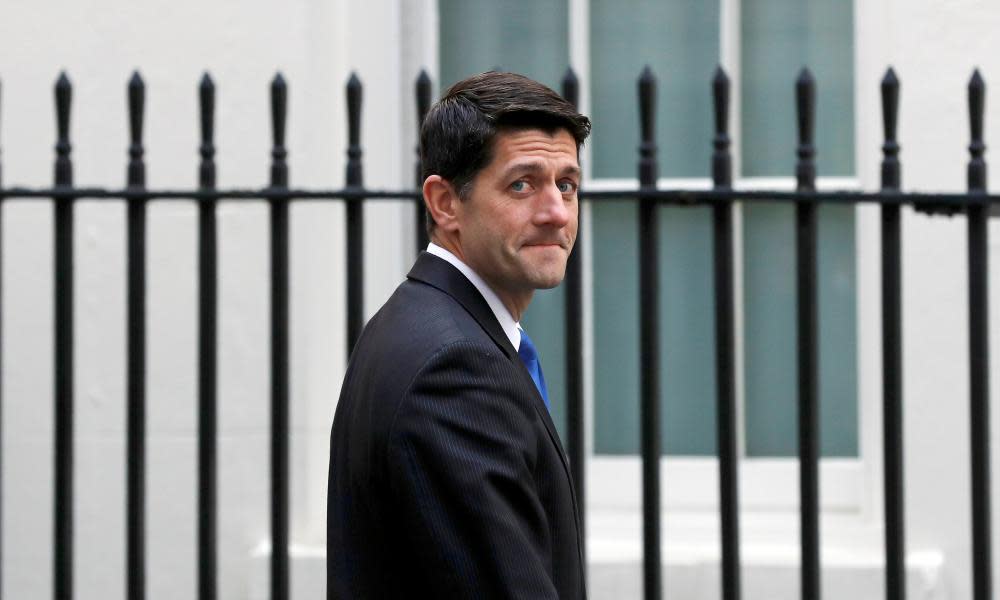Congress returns to face daunting tasks: avoid a shutdown and an angry Trump

After two weeks away, the 535 members of Congress return to Washington on Monday facing a critical deadline: they have five days to keep the government from shutting down, on the 100-day milestone of Donald Trump’s presidency.
In a rare show of bipartisanship, Democrats and Republicans are united in their determination to keep the lights on. But it’s unclear how they will navigate the competing interests of their parties and the White House to find a solution that the three sides can support.
Meanwhile, the president has expressed pained awareness of the first 100-day mark, used as a benchmark since the first term of Franklin D Roosevelt. On Friday Trump dismissed the 100 days as a “ridiculous standard” by which to judge a president’s achievements, and predicted that the media wouldn’t give him the credit he considers himself owed.
Barring dramatic action, Trump will pass the 100-day mark next Saturday without a major legislative victory – and with a conspicuous failure to guide his party to repeal and replace the Affordable Care Act. White House officials have reportedly pressed Republicans to vote on the healthcare law next week.
If the threat of a shutdown and a battle over healthcare weren’t enough to consume lawmakers time in a dizzying week , Trump also announced that he intends to unveil his tax reform plan on Wednesday.
Healthcare
Although Republicans failed to secure support last month for a replacement plan proposed by House Speaker Paul Ryan, healthcare is back on the agenda at the White House’s urging.
Speaking from London on Wednesday, Ryan said his party was “in the midst of negotiating sort of finishing touches” on a compromise that would bridge the ideological divide within his party, which controls the Senate and the House.
Over the two-week recess, conservatives and moderates came together to hammer out an amendment to Ryan’s deeply unpopular plan. The proposal, according to a one-page white paper obtained by Politico, would give states the option to opt out of key provisions, including protections for sick people with pre-existing conditions.
The amendment would keep the ACA requirement that insurance plans must cover 10 essential health benefits, such as maternity care and prescription drugs. But states could apply to waive those provisions if they could meet certain terms.
While the negotiations played out, Republican lawmakers faced constituents angry about the first replacement and determined to save the ACA at town halls across the country.
Chatter from the White House this week suggested that officials have pushed for a vote as early as next week, but that seems to be wishful thinking. A senior Republican aide said it was not yet clear whether the amendment has the votes to pass, and the bill will face its first major test in all-member conference call with Republican lawmakers on Saturday.
But on Friday, Trump shrugged off any suggestion of urgency. “If doesn’t matter if it’s next week,” he said. “Next week doesn’t matter.”
Shutdown
Administration officials, Republicans and Democrats have all expressed a desire to avert a government shutdown , but their hopes hardly ensure a deal will come easily, especially with funding set to run out at midnight on 28 April, Trump’s 100th day in office.
The White House has insisted on funding for a wall along the southern border, one of the president’s chief campaign promises – and a demand that threatens to derail negotiations. Democrats have called wall funding a “poison pill”, and reminded Trump of his promises to “make Mexico pay” for the wall.
Democrats and Republicans have been working behind the scenes to reach a deal. A senior Democratic aide said negotiations had gone smoothly with House and Senate leadership – before the White House intervened with a “heavy hand”. The negotiations have become “much murkier” since the White House became involved, the aide said.
On Friday, the Office of Management and Budget Director, Mick Mulvaney, told Bloomberg that the White House had offered Democrats a dollar to fund healthcare subsidies for each dollar they support for the wall.
Democratic leaders rejected the offer. “The White House gambit to hold hostage healthcare for millions of Americans, in order to force American taxpayers to foot the bill for a wall that the president said would be paid for by Mexico is a complete non-starter,” said Matt House, a spokesman for Chuck Schumer, the Democratic leader in the Senate.
Since his election, Trump has said Mexico would reimburse the US for the wall. Mexico has repeatedly said it will not make any payments.
Funding for a border wall is only one of a handful of landmines lawmakers are navigating to stave off a shutdown. The White House also wants a major increase in defense spending, while Democrats want to defend healthcare subsidies for low-income enrollees. One area likely to find bipartisan support is extending the healthcare for coal miners, a benefit due to lapse unless Congress intervenes.
To avoid a shutdown with a budget, lawmakers need to cobble together a compromise that will keep funding the federal government through the end of the fiscal year, on 30 September. It is more likely lawmakers will instead pass a short-term measure to keep the government funded for days or weeks past the Friday deadline, to give themselves more time to negotiate.
On Friday, senior White House officials and Trump himself downplayed the possibility of a shutdown. “I think we’re in good shape,” Trump told reporters.
Tax Reform
On Friday, Trump announced during an interview with the Associated Press that intends to release a tax package that give “massive” tax cuts for people and businesses sometime next week.
Trump did not provide details of the plan but said in the interview that it would be “bigger I believe than any tax cut ever”. Speaking later at an event at the Treasury Department on Friday, he said he would make a “big announcement” on Wednesday.

 Yahoo News
Yahoo News 
